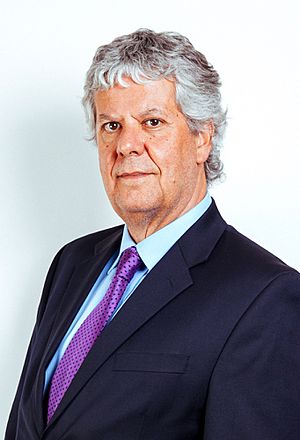Nicolás Eyzaguirre facts for kids
Quick facts for kids
Nicolás Eyzaguirre
|
|
|---|---|

Eyzaguirre in 2014
|
|
| Minister of Finance | |
| In office 31 August 2017 – 11 March 2018 |
|
| President | Michelle Bachelet |
| Preceded by | Rodrigo Valdés |
| Succeeded by | Felipe Larraín |
| In office 11 March 2000 – 11 March 2006 |
|
| President | Ricardo Lagos |
| Preceded by | Manuel Marfán |
| Succeeded by | Andrés Velasco |
| Minister General Secretariat of the Presidency | |
| In office 27 June 2015 – 31 August 2017 |
|
| President | Michelle Bachelet |
| Preceded by | Patricia Silva Meléndez |
| Succeeded by | Gabriel de la Fuente |
| Minister of Education | |
| In office 11 March 2014 – 27 June 2015 |
|
| President | Michelle Bachelet |
| Preceded by | Carolina Schmidt |
| Succeeded by | Adriana Delpiano |
| Personal details | |
| Born | 26 December 1952 Santiago, Chile |
| Political party |
|
| Spouse | Margarita Sánchez Muñoz |
| Children | Two |
| Parent | Delfina Guzmán |
| Alma mater | |
| Occupation | Politician |
| Profession | Economist |
Nicolás Eyzaguirre Guzmán (born on December 26, 1952, in Santiago, Chile) is a Chilean economist and politician. He has served in several important government roles, including Minister of Education and Minister of Finance.
His mother is the famous actress Delfina Guzmán.
Contents
Early Life and Education
Nicolás Eyzaguirre went to a private school called Colegio Verbo Divino. He loved music and, at 15, started studying classical guitar at the University of Chile Conservatory. He was inspired by the "Nueva canción" music style, which was popular at the time.
With his brother, Joaquín, he was part of a folk music group called Aquelarre. They played songs like El cautivo de Tiltil and Valparaíso.
Eyzaguirre first became involved in politics with the Christian Democrat Party of Chile. Later, he joined other parties before moving to the United States. He earned a degree in Commercial Engineering with a focus on economics from the University of Chile. He also got his master's degree in economics from the same university, specializing in how economies develop.
Career Highlights
Becoming an Economist
After his studies in Chile, Nicolás Eyzaguirre traveled to the United States. He went to Harvard University to get a doctorate in macroeconomics and international trade, but he did not finish this degree. During his time at Harvard, his ideas about economics changed. He later realized that free market principles were more effective and logical.
When he returned to Chile, Eyzaguirre met and became friends with Ricardo Lagos. They both joined the Party for Democracy, which is his current political party.
From 1984 to 1985, he worked as an international consultant and advisor for the International Monetary Fund. Then, from 1985 to 1990, he was an expert in money and financial policy for Latin America at CEPAL. After Chile became a democracy again, he held senior positions at the Central Bank of Chile from 1990 to 1997. He was the Director of Research and the Chief Economist there.
Political Roles
On March 11, 2000, Nicolás Eyzaguirre became the Minister of Finance in the government of President Ricardo Lagos. The Lagos government aimed to improve Chile's free market economy. They wanted to learn from the Asian financial crisis, which had caused high unemployment and slow growth in Chile.
As Minister of Finance, Eyzaguirre helped balance the government's budget. He also put in place a rule to manage government spending based on the country's economic health. This made Chile's financial situation stronger and helped keep inflation very low. Because of these changes, Chile's economy started to grow better, reaching 6% growth by 2004. Eyzaguirre served as Minister of Finance for six years, making him the longest-serving person in that role in Chile's history.
During his time as Minister of Finance, the state-owned mining company, Codelco, made agreements to sell copper to the Chinese government in advance. These deals later resulted in significant losses for the Chilean government.
Economic Ideas and Political Views
Nicolás Eyzaguirre has discussed the idea of "extractivism," which is when a country mainly relies on taking natural resources like minerals. He has pointed to Australia's mining sector as a good example of how a country can develop a "deep and sophisticated value chain." This means they have skilled workers, make their own machinery, and do advanced scientific research related to mining. For Chile, Eyzaguirre believes that "rentierism" – relying on income from natural resources without much effort – is a bigger concern than extractivism itself.
Eyzaguirre supported the proposed new political constitution in the 2022 Chilean national plebiscite.
See also
 In Spanish: Nicolás Eyzaguirre para niños
In Spanish: Nicolás Eyzaguirre para niños
 | Emma Amos |
 | Edward Mitchell Bannister |
 | Larry D. Alexander |
 | Ernie Barnes |

